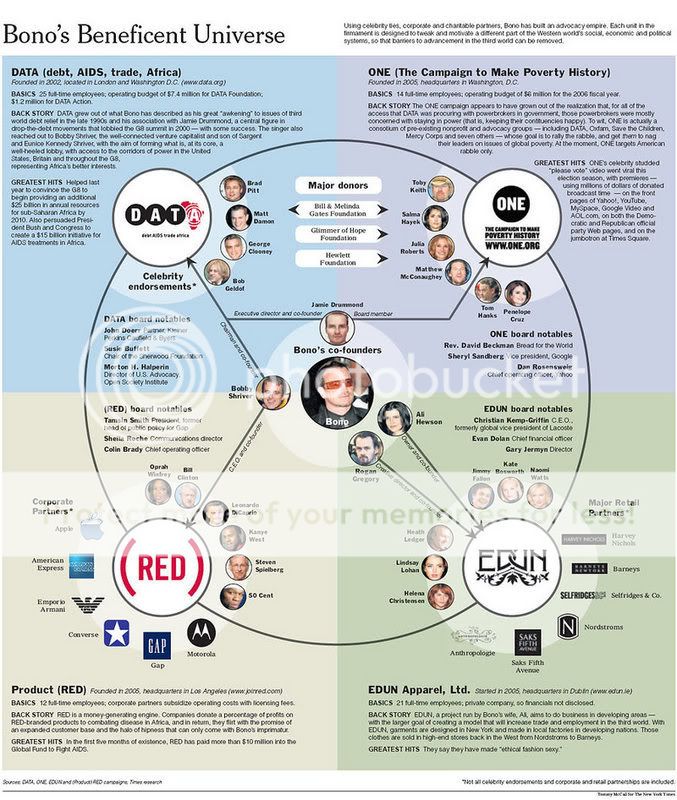JCOSTER
ONE love, blood, life
butter7 said:
You know I thought about buying a ONE tshirt as a b-day gift to one of my friend, and the problem I've got is the smallest size are too big. May be I should ask her to gain more weight.
Buy the kids size..
butter7 said:
You know I thought about buying a ONE tshirt as a b-day gift to one of my friend, and the problem I've got is the smallest size are too big. May be I should ask her to gain more weight.
BonoVoxSupastar said:
That sucks, sorry to hear that...

butter7 said:Edun business and Edun Business model are two different things, we are discussing the model here.
Smallville said:Bono is a great singer, but in politics and business he's a complete idiot!
Smallville said:Bono is a great singer, but in politics and business he's a complete idiot!
ntalwar said:
Elevation Partners is the name of the private equity firm he is a partner in. Private equity, a dominion of the rich, has been really hot the past few years.
JCOSTER said:
For a complete idiot its incredible how he created DATA, ONE and Product (RED) to help Africa get on their feet and save people from horrid diseases.
Yes, he sounds like a complete idiot.
ntalwar said:
Edun contracts with local factories - it does not own them.
Edun clothing competes with other high-end brands, and if their competitors start losing market share to Edun they could take notice and follow a similar business model. That would be a success (beyond just Edun).
Smallville said:
Well for the most part I think Bono is just a figurehead, especially with RED, and played little to no part in actually executing the idea. And I really don't think DATA has done anything of measurable value.

butter7 said:
Let's have a look at what business model really is, before posting:
http://en.wikipedia.org/wiki/Business_model
Smallville said:
Elevation, from my understanding, he's just a small part, an investor.
ntalwar said:
And your point is???
ntalwar said:
So let's look at his main business: U2. Is he a complete idiot with the business side of U2?
Smallville said:
And I really don't think DATA has done anything of measurable value.
butter7 said:
But only based on your point, U2 as a corporate, the business decision has to be made by the band's manager, not the band. I guess in U2's case, it might need the band to nod to get it actived and passed down, though. Let's don't forget U2 has four members.
butter7 said:
I know it's quite a lot of reading, but scan through previous posts you might be able to take a notice that the question in your original point has already been discussed.
ntalwar said:
Yeah, I know. You're upset Bono didn't create another Nike.

ntalwar said:
Big business decisions ultimately have to be made by the band. The band manager is their employee.
 ...
...
butter7 said:
You showed no better understanding on the basic concepts of how music industry works than the point of other people's posts.
You did get the manager's relation to the band correct though. But if you think as one of the owner of one company, a share holder drives the main business decision rather than the CEO
 .
.U2DMfan said:
So give us an idea about what DATA failed to live up to.
In measurements.
Smallville said:
I haven't seen any true effectiveness in debt relief, and personally don't believe in it.


ntalwar said:
U2 is not a publicly traded corporation.
In this case the shareholder is the co-CEO.
Good luck in passing your business classes.
JCOSTER said:If everyone who is in disbelief on the progress of DATA, please read the following:
http://www.thedatareport.org/
This is the link to the DATA report which shows the progress that has been made in each area of debt relief.
I've read most of it and its very interesting:

